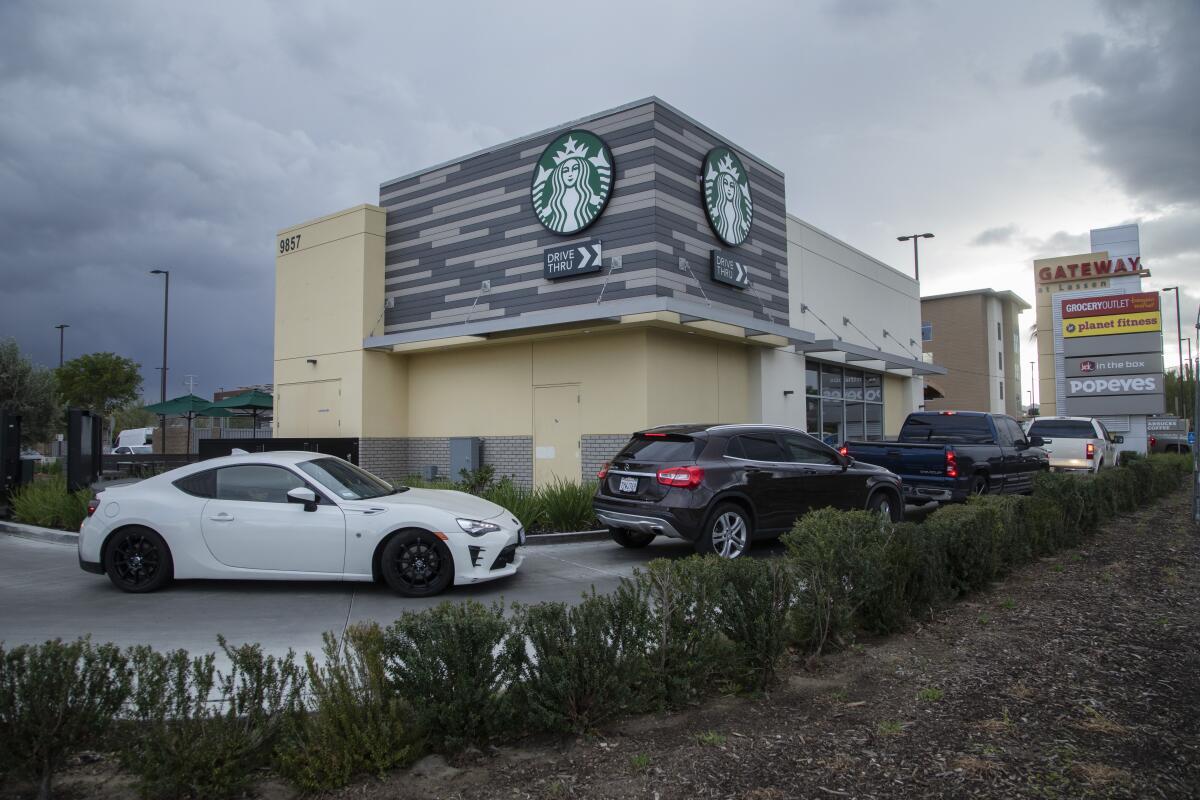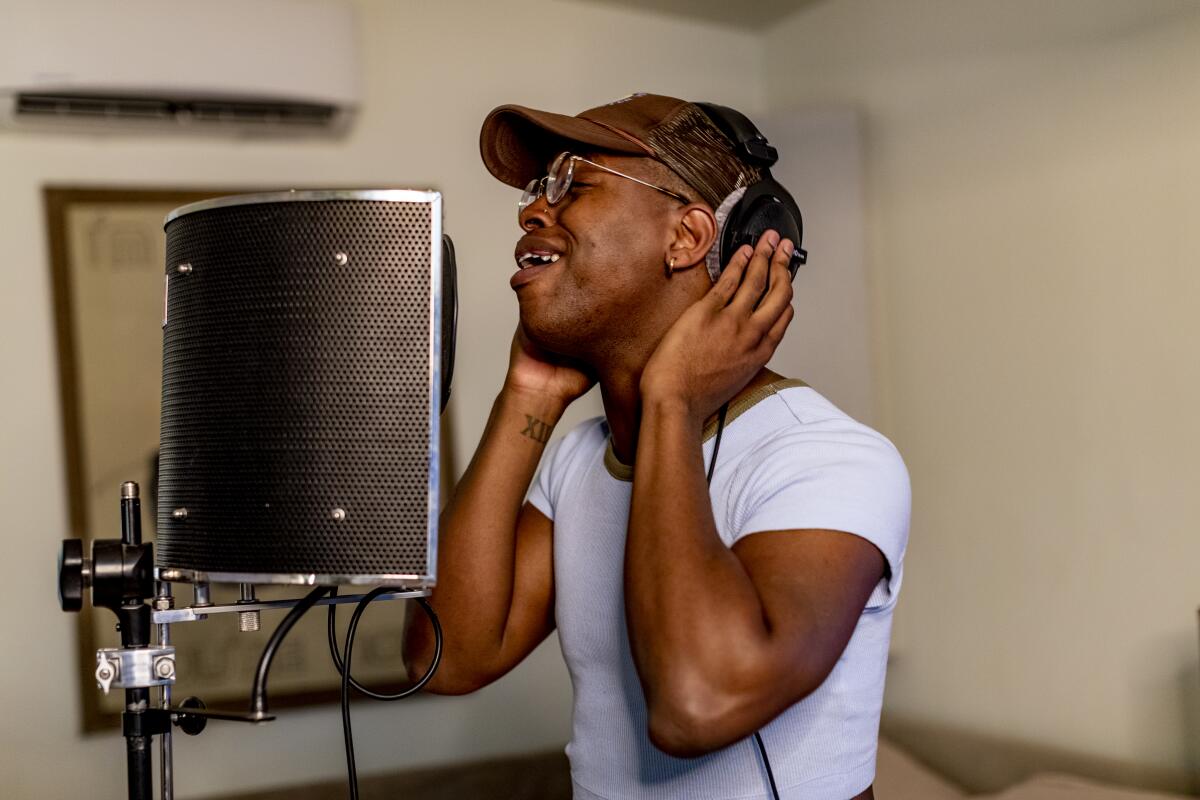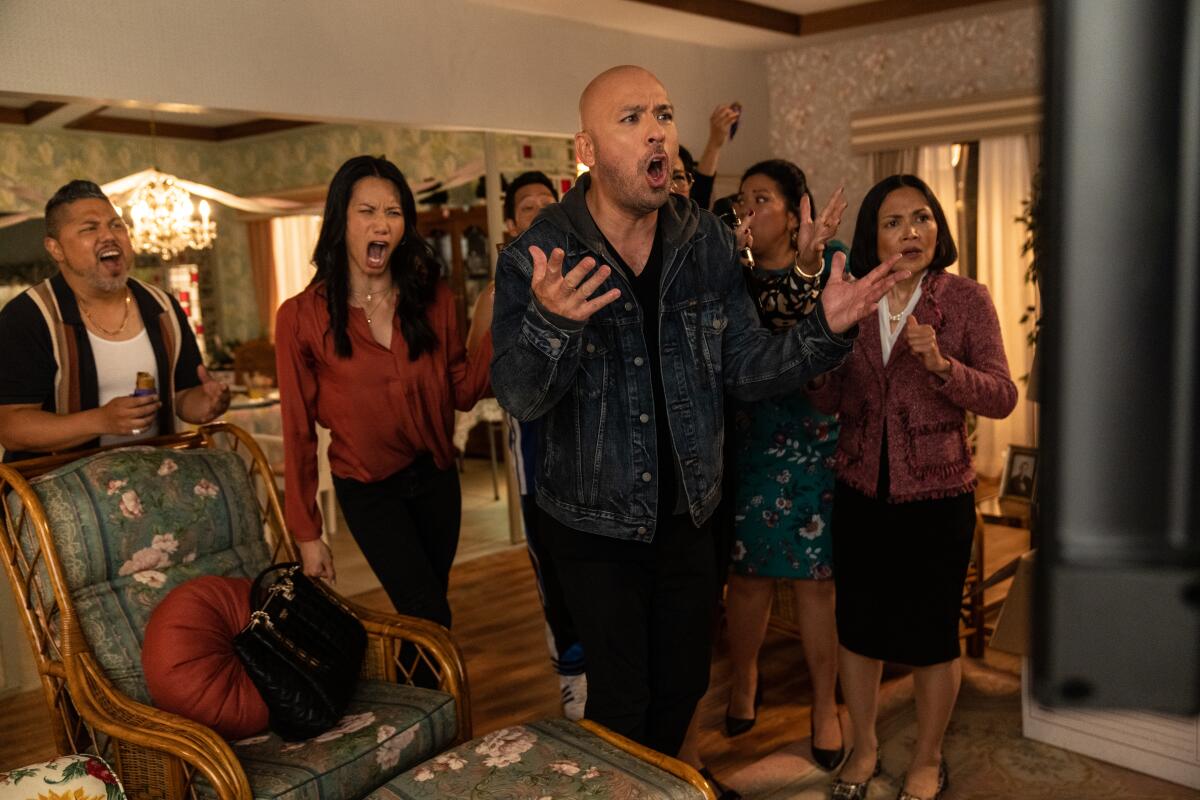Two more L.A. Starbucks unionize. Here’s what workers want you to know

- Share via
Good morning, and welcome to the Essential California newsletter. It’s Monday, Aug. 8. I’m Jonah Valdez, a breaking news reporter.
Sitting at the intersection of two main arteries of Los Angeles — the 5 and 110 freeways — a Starbucks in Cypress Park injects caffeinated life into hundreds of Angelenos each day.
Cars stream out of its drive-through, at times spilling from its parking lot and onto the street.
Yet for most workers, the constant flood of customers has them feeling overwhelmed, underpaid and desperate for change.
Last week, workers at the Starbucks at Cypress Avenue and Figueroa Street voted to unionize, becoming the second store in Los Angeles to do so, after a Little Tokyo outlet unionized in May. A day later, a Starbucks at Fairfax Avenue and Olympic Boulevard joined them. The stores make up the 13th and 14th Starbucks to unionize across California since a pair of Santa Cruz stores led the way in January.
“The biggest issue they’re running into is paying their bills, you know, having food,” said Veronica Gonzalez, a shift supervisor at the Cypress Park Starbucks who led their union campaign, when I asked about the biggest issues facing her co-workers, most of whom live in the neighborhood.
Cypress Park is a majority Latino and Asian neighborhood with working-class families. Gonzalez, who grew up there, said it’s becoming harder for locals to remain, as rents are going up and landlords look to flip homes for wealthier tenants. It’s a gentrification practice Gonzalez saw develop in nearby Highland Park, and now she’s seeing it on her own block.
When a Burger King closed at the Cypress and Figueroa intersection, Starbucks took over the spot in 2019. Gonzalez called the new coffeeshop “the stamp of gentrification.” But she, like many of her neighbors, needed work, and was lured by the promise of fair pay and benefits, including healthcare coverage.
When Starbucks earlier this year began to cut employees’ hours at sites across the U.S., Gonzalez and her co-workers saw their workweeks shortened by at least 10 hours, severely slashing their pay.
Workers struggled to pay rent and other bills. Many had to pick up second and third jobs. Others quit. Some struggled to feed their families.
For some workers, their first and, at times, only meal of the day comes after clocking in at Starbucks, Gonzalez said. The store allows employees one food item per shift.
Many organizers and workers have accused the chain of cutting hours and firing employees as a way to bust unions. Starbucks has long denied allegations of union busting or retaliation, saying its decisions to cut hours are based on the needs of the company.
But for Gonzalez and her co-workers, the labor cuts only fueled them to start organizing.
“One job should be enough. I don’t think that’s radical. One job should be enough, and honestly, it’s that expensive to live here. Like, your rent is minimum $1,500, and if you’re not splitting that, that’s your Starbucks check right there,” Gonzalez said.
Gonzalez knew what it was like to be a part of a union, having worked unionized food service jobs at the L.A. Zoo and Dodger Stadium. So one evening in May after her shift, she started making phone calls to co-workers and visiting their homes. A month later, workers at the store filed for a labor union election.
Around the same time, the store on Fairfax and Olympic in Little Ethiopia filed for its election. Both ran their campaigns simultaneously, receiving support from workers of other unionized stores, such as ones in Long Beach and Lakewood. The stores would host “sip-ins” where customers could show up and voice support for the unionization campaigns.
But with the support came anti-union messaging from the company. Managers would hold meetings where they would tell workers that if they unionized, pay would be reduced, benefits lost and promotions and the flexibility to transfer stores denied, according to Gonzalez and Cassie Pritchard, a barista who led the Little Ethiopia Starbucks union campaign.
The pushback left some workers afraid to support the union, Pritchard said.
Pritchard, a trans woman, said the threat of losing healthcare is felt heavily by trans employees, many of whom have relied on Starbucks for coverage of surgeries or hormone therapy.
“These are complementary struggles,” she said. “Unionizing at my Starbucks is part of fighting for trans liberation and equality. They’re not distinct. They’re very much one and the same effort.”
In recent months, Starbucks closed six locations, citing safety issues. Although none of those stores were unionizing, Starbucks Workers United contended that the closures were in response to the growing union movement across the country. Other branches have fired workers who were leading unions. Starbucks has pointed to policy violations or previous incidents on the job as reasons for the firings.
Last week, Pritchard’s store won its election, with eight in favor of the union and four against. In Cypress Park, 21 voted for the union, while two were opposed.
For the vote count, which was streamed through Zoom, workers from the Cypress Park store gathered at a union hall in MacArthur Park. Separated by early morning, midday and evening shifts, many were meeting in person for the first time. With every yes vote, the group applauded and screamed. The rare no vote drew boos. After months of a hard and, at times, lonely campaign, Gonzalez was surprised by the excitement and energy and relished every second.
“The company isn’t showing us what we mean to them,” Gonzalez said. “So we’ll create value within ourselves, you know? Like, I’ll support you, I’ll value you. Let’s create that community.”
Sign up for Essential California
The most important California stories and recommendations in your inbox every morning.
You may occasionally receive promotional content from the Los Angeles Times.
And now, here’s what’s happening across California:
Note: Some of the sites we link to may limit the number of stories you can access without subscribing.
L.A. STORIES

Californians are finding ways to connect despite monkeypox fears. As vaccines for preventing monkeypox remain in short supply amid state of emergency declarations, many California residents are wondering what they can and cannot do. Some have decided to take some control and alter their lives in ways that allow them to connect with others. For some members of the LGBTQ community, that has meant dressing differently at circuit parties or limiting sexual contact to people they’re already familiar with and have confirmed aren’t infected, as opposed to hooking up with strangers. Los Angeles Times
Salvadoran Americans in L.A. celebrate their culture and traditions. Salvadoran Day was inaugurated in 1999. On Saturday and Sunday, Salvadoran Americans gathered at Normandie Avenue and Venice Boulevard to celebrate. A 12-year civil war in the 1970s and 80s, during which the U.S. aided the El Salvador government, had forced many Salvadorans to flee to the U.S., including social activists. Salvadoran Day was meant to celebrate a legacy of striving for social justice and united community action. Los Angeles Times
Support our journalism
POLITICS AND GOVERNMENT

The path toward renewable energy remains daunting. With a landmark climate bill passed through the Senate, a path toward clean energy and away from fossil fuels feels more possible. The federal government is willing to fund huge energy projects like building solar farms, wind turbines and electric power lines. But finding the land for it — 225,000 square miles, an area much bigger than California — is difficult. There is bound to be opposition from landowners, Native American tribes and even environmental activists. Los Angeles Times
San Clemente tried and failed to get rid of abortion. In a 3 to 1 vote over the weekend, the City Council withdrew its proposal that would have made San Clemente abortion-free. Before the vote, most inside the council chambers expressed anger, with some residents terming the proposal “overreach,” “idiotic” or “extremist.” Los Angeles Times
The majority of L.A. COVID-19 relief funds have been spent on cops and firefighters. The city has spent $1 billion in COVID-19 relief funds from the federal government. Nearly two thirds of the money has gone to pay the salaries of police, firefighters, park rangers and other city employees, according to a report from the Chief Administrative Officer of Los Angeles. None of the money was allocated toward building housing for the homeless or health initiatives like vaccines. L.A. Taco
HOUSING
Housing the unhoused in hotels? L.A. voters will get to decide in 2024 whether hotels will be required to rent vacant rooms to homeless people. The City Council rejected an option that would have skipped the public vote and enacted the ordinance directly, instead voting 12 to 0 to send the measure to the ballot. The hotel industry is expected to mount vigorous opposition to the ballot measure. Los Angeles Times
Ski resort workers are living in campsites amid housing crisis. Last winter, Palisades Ski Resort in Lake Tahoe started sending its workers to live in a campground near Highway 89, where they could park their vans during the snowy months with no heat, water or electricity. Palisades operated the campsite, which gave workers a single amenity: waterless toilets with holding tanks underneath. The resort is looking to expand its “housing” program, and other resorts are looking to replicate it. San Francisco Chronicle
CRIME AND COURTS
Can there be justice in the SDSU football rape case? A 17-year-old girl reported that she was raped by San Diego State University football players last fall. What followed was a nine-month police investigation. Now, as the school’s investigation begins, some are concerned that it may be too little, too late. San Diego Union-Tribune
Our daily news podcast
If you’re a fan of this newsletter, you’ll love our daily podcast “The Times,” hosted every weekday by columnist Gustavo Arellano, along with reporters from across our newsroom. Go beyond the headlines. Download and listen on our App, subscribe on Apple Podcasts and follow on Spotify.
HEALTH AND THE ENVIRONMENT
COVID-19 vaccination rates among children remain low as a 12th child dies in L.A. County. With summer vacation ending, health officials are urging parents to get their children vaccinated against COVID-19, with some warning that the start of the school year could bring an increase in cases. This will be the first time during the pandemic that the traditional school year will begin in California without a statewide school mask mandate in place, and vaccination rates remain low among children. Although COVID-19 deaths are rarer among youth than adults, the county reported its 12th pediatric COVID-19 death. Los Angeles Times
The McKinney fire continues to burn amid strong winds. Officials worried that strong winds in the Shasta Valley could hinder the progress made in recent days by thousands of firefighters in containing the massive and deadly McKinney wildfire, which is burning at the California-Oregon border. The fire has killed four people, destroyed 87 homes and consumed 60,044 acres. Los Angeles Times
CALIFORNIA CULTURE
Nisei Week begins later this week. A celebration of Japanese American culture, Nisei Week, hosted in Little Tokyo, will include its annual lineup of ondo dance, displays of bonsai and calligraphy, anime artists, parades, festivals and food vendors. Nisei, which means “second generation” in Japanese, refers to the first American-born Japanese. Nisei Week
Revisiting Berkeley’s Black cultural center. Today, the building is beige, bland and unassuming. But in the 1970s, the Rainbow Sign was a Black-centered space that was open to all — as a performance venue, a political organizing nexus and a legendary cafe. It hosted Black luminaries, including James Baldwin, Nina Simone, Maya Angelou and Shirley Chisholm. It also left a deep impression on a young Kamala Harris. KQED

Comedian Jo Koy’s film “Easter Sunday” debuted this weekend. Although reviews have been mixed, the movie carries significance for the Filipino American community. With a majority Filipino cast, the release has caused many Filipinos to reflect on their representation in media. For Filipinos in Hollywood and those at home watching, “Easter Sunday” is helping to process experiences of being seen and not seen. Los Angeles Times
Free online games
Get our free daily crossword puzzle, sudoku, word search and arcade games in our game center at latimes.com/games.
CALIFORNIA ALMANAC
Los Angeles: mostly sunny, 89. San Diego: partly cloudy, 79. San Francisco: partly cloudy, 70. San Jose: partly cloudy, then mostly sunny, 77. Fresno: sunny, 97. Sacramento: sunny, 93.
AND FINALLY
Today’s California memory comes from Lois Gerard:
My family moved from New York to L.A. in 1957, just as I entered seventh grade. I remember the smog being so thick most days, you couldn’t see the Hollywood Hills from Hollywood. When the rare windy day blew the smog away, my father would say, “If it were like this all the time, people would move here in droves.” The tallest buildings were the City Hall and Wiltern Theater. Trolly car rides were 15 cents. I walked on Bunker Hill when there were still houses there. I took the Angels Flight and rode the Red Car to Long Beach.
If you have a memory or story about the Golden State, share it with us. (Please keep your story to 100 words.)
Please let us know what we can do to make this newsletter more useful to you. Send comments to essentialcalifornia@latimes.com.
Sign up for Essential California
The most important California stories and recommendations in your inbox every morning.
You may occasionally receive promotional content from the Los Angeles Times.







